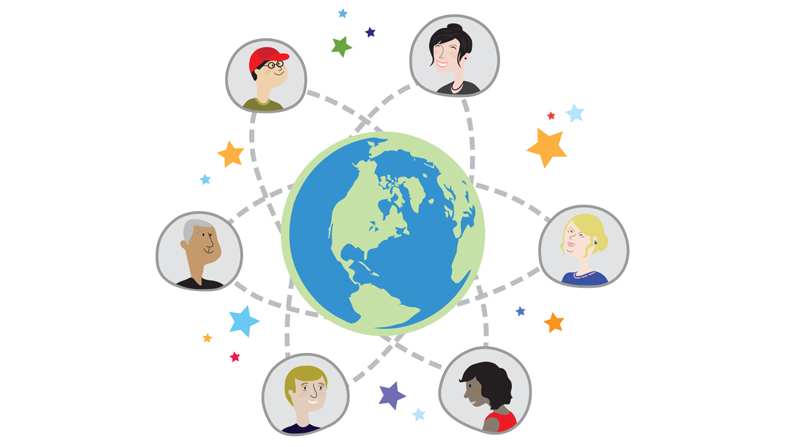Job Search and Networking -
Networking Basics

Job Search and Networking
Networking Basics


/en/jobsearchandnetworking/find-a-job-online/content/

A willingness to network and build connections will be the single most useful tool in your job search. Networking is considered to be the most effective way to find a job, but every person will need to build his or her own network differently.
In this lesson, you'll learn about the basics of networking and how it can be helpful to your job search. We'll also talk about different networking strategies that will help you gain meaningful connections as you develop your network, such as how to ask purposeful questions and craft your elevator pitch.
Networking is simply the process of building positive, advantageous relationships, either by making a connection with someone in person or online. While some people have an easier time making new connections than others, it's important to remember that everyone is capable of networking.
You probably already have networking experience, even if you don't think of it in those terms. Any time you meet someone or make a new friend, you're engaged in a form of networking. Making good use of your connections can make finding a job that much easier.
Watch this video from AARP to learn more about the basics of networking...
Networking is considered to be the single most effective way to find a job. The majority of job seekers found their most recent position by networking, either through referrals or direct contact with a hiring manager.
Let's imagine you are responsible for hiring a person to work at your company. Would you rather hire someone you've never met or someone you already know and trust? It is estimated that as much as 80 percent of available positions are never even advertised. Networking with different people can allow you to find opportunities in this hidden job market.
Making the decision to start networking can feel a little overwhelming, but it's important to remember that no one builds a network from scratch. Your family and friends already make up a powerful network of different connections.
Reaching out to your existing network is a great way to start practicing your networking skills. Over time, you'll feel more comfortable expanding your network and building new connections. Take some time to organize your existing connections and identify opportunities you can pursue.

Once you have a firm grasp on your existing connections, you may be ready to grow your network and develop new relationships. While there is no single way to create a network, there are several strategies you can use to make the most of your time.
Here are some techniques that will help you to expand your network and build meaningful connections...
Be careful not to exclude anyone from your network as you begin seeking out new connections. Remember that the majority of job referrals are made through friends of friends. Anyone might turn out to be a valuable networking contact, even if they don't work directly in your career field.
The more people who know about your job search, the better. By expanding your network, you'll have a greater chance of finding a new position.
The most successful networkers are constantly meeting new people and expanding their networks, even when they're not actively searching for a job. As you work to build new connections, remember that networking is a two-way street—there must be some mutual benefits for both parties involved.
Show an interest in what other people have to say instead of focusing exclusively on your needs. A relationship founded on mutual trust and respect will be the most likely to benefit you in the long term.
How you present yourself can have a significant impact on the kind of impression you make. While it's easy to become discouraged in the middle of a long job search, it's important to remain positive and optimistic when introducing yourself to others.
Broadcasting your frustrations will only make it more difficult to gain new connections. Even if you're coming out of a tough situation, be sure to project confidence.
Asking a series of purposeful questions can help you engage someone you're meeting for the first time. Most people generally like talking about themselves, so don't shy away from asking about someone's career and interests.
At this point, you should be focused on getting to know your new contact and how this person might fit into your network. You're not asking for a job, just more information.
Consider asking some of the following questions when you're meeting someone for the first time...
In busy social settings, you may only have a few moments to capture someone's attention or make an impression. One of the most effective ways to get your message across is to develop a personal elevator pitch. An elevator pitch is a clear, succinct, and specific statement that describes you and your strengths in less than 30 seconds. Preparing your speech in advance can also help you feel more comfortable introducing yourself to new people.
Your elevator pitch should explain who you are, what you're seeking, and what you can offer. Here are some examples of different elevator pitches...
For an experienced web designer:

For a mid-level loan officer:

For an entry-level medical assistant:

After you've composed your pitch, be sure to practice it by yourself and with friends until it sounds natural. Don't be afraid to modify your speech over time, or adapt it for certain situations. Remember, your elevator pitch should leave someone wanting to know more about you. An introduction has the potential to become a more lengthy conversation or even a screening interview, so be prepared to talk about your experience and what you could contribute.
How you conclude your first meeting with a new contact is vital to building an effective relationship. Even if your encounter is brief, make sure you leave it with a request to keep in touch, either by meeting again in person or connecting online through email or social media.
Remember, networking is a long-term investment that requires time and persistence. Most of the connections you make will not have anything to offer you initially. By politely following up with your contacts, you'll be able to develop a relationship over time. The stronger your relationships, the more likely it is that your connections will think of you when opportunities arise.
We'll talk more about online networking in our Job Hunt with Social Media lesson.
Take some time to reflect on the following questions as you begin building your network:
/en/jobsearchandnetworking/job-hunt-with-social-media/content/